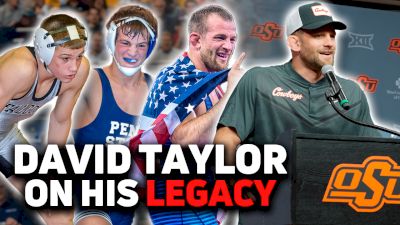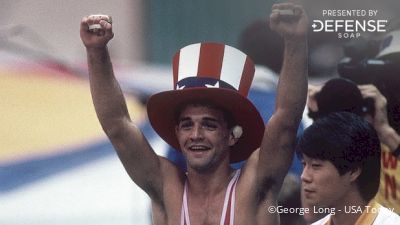5 Underrated Iowa Wrestling Stars That Deserve More Credit
5 Underrated Iowa Wrestling Stars That Deserve More Credit
These five Iowa wrestlers are great, but they deserve more credit than they are getting.
The University of Iowa is among the standard bearers for greatness in wrestling, but a few names get overlooked. Here are five underrated Hawkeye wrestling legends that deserve more credit.
5. Jeff McGinness
How’s this for being overlooked? McGinness hasn’t been inducted into his high school’s hall of fame. The former Iowa City, City High star completed his prep career undefeated with four state titles.
Let that sink in: Iowa is a state known worldwide for wrestling, and McGinness’s high school HAS NOT inducted arguably the greatest high school wrestler in state history into its hall of fame.
McGinness stayed home and won two NCAA titles for the Hawkeyes following a fifth-place finish as a true freshman. He is among a rare class that won a second NCAA title two weight classes higher than his first, and he is the only Iowa wrestler to accomplish this feat. McGinness was nearly impossible to keep down and was tough on top. He was a three-position wrestler who had all the tools.
4. Eric Juergens
Like McGinness, Juergens completed his high school career undefeated with four state titles. Juergens and McGinness also represent the state of Iowa’s only four-time champions to win multiple NCAA titles.
Juergens never lost a match on Saturday at the NCAA Championships, finishing third during his first two seasons before winning two titles. He defeated future three-time NCAA champion and 2004 Olympic silver medalist Stephen Abas twice at the 1998 NCAA Championships, with an 11-8 quarterfinal win and a 5-3 overtime victory in the consolation finals. The Maquoketa, Iowa, native dropped one match during his final two seasons.
His cross-ankle pick is among the best in the game.
3. Brad Penrith
Penrith is part of Iowa’s 57-kilogram freestyle legacy but often gets overlooked by higher-profile names like Barry Davis, Terry Brands, Thomas Gilman, and Spencer Lee. Overlook Penrith at your peril.
World champion Zeke Jones says that Penrith is “by far” the toughest wrestler he’s ever faced. Former teammate Kevin Dresser called Penrith a wrecking machine in and out of the wrestling room.
The Windsor, New York, native won the 126-pound NCAA title in 1986 followed by two runner-up finishes the next two seasons. He made a pair of World teams, winning a silver medal in 1991 when he had a swollen foot and had to borrow someone else's shoes.
Penrith was three wins away from being a three-time NCAA champion and World champion. Had Mixed Martial Arts been in place during his competitive prime, the former Iowa star surely would have been in contention for a UFC belt.
2. Chris Campbell
Campbell was so good that it defies logic. He won NCAA titles in 1976 and 1977 after a runner-up finish as a sophomore. He was nearly impossible to take down and his precise takedown game was unmatched.
He finished fifth at the 1977 World Championships before making the 1980 Moscow Olympics which were boycotted by the United States. He was named the most technical wrestler in the world after winning the 1981 World Championships.
A lengthy retirement from active competition yielded a memorable comeback. Campbell won a silver medal at the 1990 World Championships at 36 — nine years after his World title. A fifth-place finish at the 1991 Worlds led to a bronze medal at the 1992 Olympics.
“Chris was special,” said three-time World and Olympic champion Kevin Jackson. “His technical skills were unbelievable. His technique was so sound. His positioning was so sound. He was so strong. So athletic. He never got out of position and never exerted force or energy that wasn’t needed.
“To see what he did at that age is incredible. I think it’s unprecedented. He’s the only guy I’ve ever seen make a comeback and compete as well as he did in big-time competitions.”
1. Randy Lewis
Lewis was on track to be the undisputed greatest wrestler in program history and now he doesn’t get mentioned on some top 10 lists.
The Rapid City, South Dakota, native finished second at the 1978 NCAA Championships at 126 pounds as an 18-year-old true freshman and made a Senior-level World Team a few months later. He won the 1979 NCAA title at 126 pounds and the 1980 title at 134 pounds before making the 1980 Moscow Olympic Team that the United States boycotted due to the Soviet Union’s invasion of Afghanistan.
Had everything gone according to plan, Lewis would have won this third NCAA title in 1981 with the most falls in program history. It’s hard to argue against Lewis’s Iowa GOAT status with three NCAA titles, four appearances in the finals, four Big Ten titles, two World/Olympic teams in college, and unmatched dominance.
Instead, Lewis finished seventh his senior season with three Big Ten titles, and his 64 career falls is second in program history behind Ed Banach’s 73.
What happened?
Everything changed when Iowa faced Iowa State on January 9, 1981, in Hilton Coliseum.
Jim Gibbons had retribution on his mind after a controversial loss to Lewis at Midlands a few days prior. Gibbons was doing everything right during his 134-pound match against the returning two-time NCAA champion and 1980 Olympian. The Cyclone star was in on a shot when Lewis posted his arm and dislocated his elbow. Gibbons won by injury default and, because of the injury, Lewis didn’t compete again until the Big Ten Championships, where he finished second.
Lewis entered the loaded 134-pound bracket seeded third and eventually finished seventh after dropping a 13-6 match to Gibbons in the quarterfinals.
Many of Lewis’s teammates say he was the best they’ve ever seen, but most only look at NCAA titles when evaluating a wrestler’s greatness. Even without a third NCAA championship, Lewis — at a minimum — deserves to be in the conversation.
Related Content
 Top 5 NCAA Duals Of The 2023-2024 Season On FloWrestling
Top 5 NCAA Duals Of The 2023-2024 Season On FloWrestlingMay 26, 2024
 Historic Coaching Hires Shift College Wrestling Landscape
Historic Coaching Hires Shift College Wrestling LandscapeMay 23, 2024
 Spencer Lee's Top 5 Senior Level Matches On FloWrestling
Spencer Lee's Top 5 Senior Level Matches On FloWrestlingMay 23, 2024
 Barry Davis Hired As An Assistant Wrestling Coach At Navy
Barry Davis Hired As An Assistant Wrestling Coach At NavyMay 22, 2024
 Iowa Wrestling Plucks Parco From Portal, Brings Back Brands
Iowa Wrestling Plucks Parco From Portal, Brings Back BrandsMay 21, 2024
 Iowa's Grand Opening Ceremony For New Wrestling Facility
Iowa's Grand Opening Ceremony For New Wrestling FacilityMay 31, 2024
 David Taylor Reflects On His Wrestling Career
David Taylor Reflects On His Wrestling CareerMay 21, 2024
 Kiara Djoumessi Preparing For First Season At Iowa
Kiara Djoumessi Preparing For First Season At IowaMay 20, 2024
 The Case For Zain As Olympic Champion Is Simple
The Case For Zain As Olympic Champion Is SimpleMay 18, 2024
